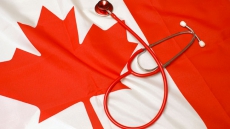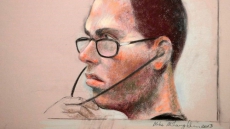OTTAWA - The young Pakistani education activist who shared this year's Nobel Peace prize will formally receive honorary Canadian citizenship this month.
Prime Minister Stephen Harper pledged to make Malala Yousafzai, 17, an honorary citizen during last year's speech from the throne, but it wasn't until Friday that the government made another public reference to her citizenship.
In a statement, Harper said Yousafzai will visit Ottawa on Oct. 22.
"We look forward to pursuing our collaborative efforts on children's education," he said.
Yousafzai, an outspoken advocate for girls education, was shot in the head by Taliban gunman two years ago as she was on her way home from school in Pakistan.
She survived to become an international advocate for the right of girls to go to school, though she works from Britain because she's still under threat in her home country.
Yousafzai became the youngest Nobel winner ever as she and Kailash Satyarthi of India won the Nobel Peace Prize on Friday for working to protect children from slavery, extremism and child labour at great risk to their own lives.
Canadians have played a big role in supporting the work of Yousafzai and Satyarthi, said children's rights activist Craig Kielburger.
Yousafzai travelled to Kenya with the organization this summer to build her first school, he said. Young Canadians also funded Kailash's largest child rescue centre, Bal Ashram.
"I think Canada should be proud," he said in an interview. "It's a really nice day for kids who are passionate believers in child rights."

Yousafzai becomes the sixth person to receive honorary Canadian citizenship.
Though Harper said in his statement that she was named an honorary citizenship on Oct. 16, 2013, a search of parliamentary records did not find any mention of the honour being granted other than the reference in the throne speech that day.
Five other people have been granted honorary Canadian citizenship: Raoul Wallenberg, Nelson Mandela, the Dalai Lama, Aung San Suu Kyi and the Agha Khan.
In all five cases, motions bestowing the honour upon them were passed in Parliament.
Neither the prime minister's office nor the office of the immigration minister answered requests for clarification.
Earlier Friday, after the Nobel prize announcement, Immigration Minister Chris Alexander didn't respond to questions about the status of the throne speech promise. He said only that the commitment remained in place.
Within hours, Harper's statement was released.
Harper sat down with Yousafzai in New York in September 2013 when both were in town for meetings at the United Nations.
The nature of their meeting wasn't disclosed, but at the time Yousafzai was commemorating the first anniversary of a global education program run by the UN.
In 2011, Canada contributed $45 million to the Global Partnership for Education program over three years, according to the website of the Foreign Affairs Department.

The New Democrats wondered Friday what's happened to Canada's commitment.
"Malala asked Canada to make a pledge to the Global Partnership for Education, which held its replenishment conference last June, but the government has made no pledge at that conference, or since," said Helene Laverdiere, the NDP international development critic.
The government replied that the commitment was under consideration.





